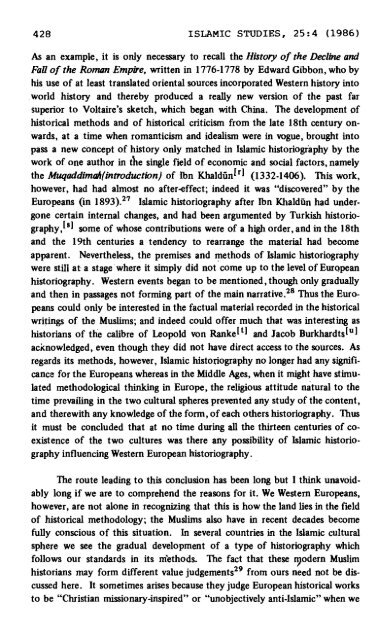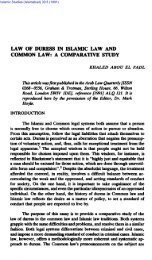ISLAMIC & WESTERN HISTORIOGRAPHY
ISLAMIC & WESTERN HISTORIOGRAPHY
ISLAMIC & WESTERN HISTORIOGRAPHY
You also want an ePaper? Increase the reach of your titles
YUMPU automatically turns print PDFs into web optimized ePapers that Google loves.
428 <strong>ISLAMIC</strong> STUDIES, 25:4 (1986)<br />
As an example, it is only necessary to recall the History of the Decline and<br />
Fall of the Roman Empire, written in 1776-1778 by Edward Gibbon, who by<br />
his use of at least translated oriental sources incorporated Western history into<br />
world history and thereby produced a really new version of the past far<br />
superior to Voltaire's sketch, which began with China. The development of<br />
historical methods and of historical criticism from the late 18th century onwards,<br />
at a time when romanticism and idealism were in vogue, brought into<br />
pass a new concept of history only matched in Islamic historiogiaphy by the<br />
work of one author in the single field of economic and social factors, namely<br />
the Muqaddimd(introducti0n) of Ibn IChaldfinl'l (1332-1406). This work,<br />
however, had had almost no aftereffect; indeed it was "discovered" by the<br />
Europeans (in 1893).~' Islamic historiography after Ibn Khaldiin had undergone<br />
certain internal changes, and had been argumented by Turkish historiography,[B1<br />
some of whose contributions were of a high order, and in the 18th<br />
and the 19th centuries a tendency to rearrange the material had become<br />
apparent. Nevertheless, the premises and methods of Islamic historiography<br />
were still at a stage where it simply did not come up to the level of European<br />
historiography. Western events began to be mentioned, though only gradually<br />
and then in passages not forming part of the main narrati~e.~' Thus the Europeans<br />
could only be interested in the factual material recorded in the historical<br />
writings of the Muslims; and indeed could offer much that was interesting as<br />
historians of the calibre of Leopold von ~anke[~] and Jacob ~urkhardts["I<br />
ac~nowledged, even though they did not have direct access to the sources. As<br />
regards its methods, however, Islamic historiography no longer had any significance<br />
for the Europeans whereas in the Middle Ages, when it might have stimulated<br />
methodological thinking in Europe, the religious attitude natural to the<br />
time prevailing in the two cultural spheres prevented any study of the content,<br />
and therewith any knowledge of the form, of each others historiography. Thus<br />
it must be concluded that at no time during all the thirteen centuries of coexistence<br />
of the two cultures was there any possibility of Islamic historiography<br />
influencing Western European historiography.<br />
The route leading to this conclusion has been long but I think unavoid-<br />
ably long if we are to comprehend the reasons for it. We Western Europeans,<br />
however, are not alone in recognizing that this is how the land lies in the field<br />
of historical methodology; the Muslims also have in recent decades become<br />
fully conscious of this situation. In several countries in the Islamic cultural<br />
sphere we see the gradual development of a type of historiography which<br />
follows our standards in its m'ethods. The fact that these ~yodern Muslim<br />
historians may form different value judgements29 from ours need not be dis-<br />
cussed here. It sometimes arises because they judge European historical works<br />
to be "Christian missionary-inspired" or "unobjectively anti-Islamic" when we
















